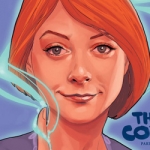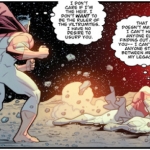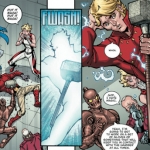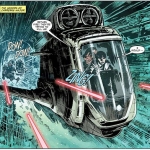
Photo credit: soundfromwayout
Getting started reading a new comic book series can be a intimidating prospect, especially if it’s an established series that already has a lot of backstory and characters with well developed histories. It can feel like you’re jumping into the deep end of the pool without knowing how to swim, and you might even find yourself worrying about how to catch up more than you actually enjoy reading the series. But fear not! Here are some tips for getting into a new series with the least amount of pain and resistance.
You’re Not Alone
First and foremost, keep in mind that you’re not alone in your plight. There are tons of X-Men fans, and very, very few of them actually started reading at the very beginning. Everybody had to start somewhere, and the vast majority of them jumped in midstream, just like you’re about to do for whatever series you’re about to try.
Jump Right In
As scary and counter intuitive as it might seem, the best way to get started with a comics series is to just jump right in, unless it’s a planned series with a discrete beginning, middle, and end. I’ll address those in a moment, but for now I’m assuming you’re dealing with an ongoing series like Superman, Captain America or any of the numerous Avengers titles. Ongoing comic books usually run in multi-issue story arcs. If you’d like a god jumping-on point, wait for the beginning of the next story arc to begin, grab that issue, and just start reading. Most of the time you can see that an issue is the start of an arc because it will have a subtitle somewhere on it, followed by “1 of” however many issues are in the arc.
Even if you catch a series mid-arc, the best thing to do is just to start reading with the newest issue. Sure, there’ll be a lot of new characters, plots, relationships, and situations, but that’s going to be true regardless of where you start in a series—even if you did manage to begin with the very first issue. Try reading your first issue without worrying about everything that came before. Learn the characters and figure out the story on the merit of that single issue. If you’re completely lost at the end of that issue, you’ll be tempted to think it’s because of your newbie-ness to the series, but chances are that it’s just because it was a poorly written issue. The best issues are accessible to new readers while still paying off for longtime fans.
Once you have your first issue behind you, you’ll probably have a lot of questions about the story and characters you’ve just read about. Even though you’re still lost and need a lot of information, you now have a starting point for learning, which is better than you had before. You’ll have at least a sense for some of the characters, and you’ll have a context for learning about them. And learning about them is a lot easier nowadays than it was back when I read my own first comics.

Photo credit: sylvar
Do Your Research
There are a few main avenues you can pursue for learning more about the comic series and characters after you have a baseline from reading your first issue. The first, and possibly the best resource, is Wikipedia. Wikipedia is a user-generated resource with information about nearly anything you could imagine. That information isn’t limited to just states and countries, animal species, and political figures; it’s also an indispensible resource for comic book information. Just do a search for any character you’re interested in, and chances are that you’ll find a full biography with anything and everything you need to know.
Another good way to learn not only about the characters but also about what has come before in the comic is trade paperbacks and hardcovers. Most comic companies readily republish their issues and storylines in collected editions. Pick up a couple of books from your series’ past, and you’ll have some ready-made reading material that can help bring you up to speed.
One more great way to learn enough to become invested in your new fandom is to actually interact with the fandom. There are many fantastic forums online that allow fns and readers to converse and debate about the latest developments and issues in their favorite series. If you check out a site like Newsarama or even just do a Google search, you should be able to find a good forum without much trouble. Try lurking and reading what other people are talking about, and you could even try posting a request for some guidance on getting started with your particular series. The forms tend to be filled with rabid fans, and rabid fans love nothing more than to be able to put their knowledge of the fandom to use. And what better way to do that than to show their stuff to someone else and initiate a new reader into the fold?
The Exception To The Rule
All of the above methods and tips are great for getting started reading ongoing comics, but you need to take a different approach if you’re interested in reading something like Preacher, 100 Bullets, Watchmen, or any number of other great self-contained series that have a planned beginning, middle, and end. These sorts of comics—very often published by DC under their Vertigo imprint—are carefully crafted stories with a lot of built in continuity, and they don’t really lend themselves to the jump-in-and-learn approach. Just like you wouldn’t start watching Babylon 5 in the middle of season 3, you wouldn’t start reading The Stand midway through, and you wouldn’t start watching Blade Runner 45 minutes in, you’ll be robbing yourself of half the fun if you don’t start these tightly serialized comics from the beginning.
Thankfully, these series nearly always have been collected in various formats, and it’s easy to find early volumes of the collected editions still in print today. Just go to Amazon or head out to your favorite comics shop, and pick up the first couple of volumes of the trade paperbacks. You’ll be able to experience the story and learn the characters exactly like your are supposed to—by reading from the beginning of the story.

Photo credit: stuttermonkey
Branch Out
Once you’ve started a new comics series, it’s very likely that you’ll get attached to or interested in particular characters. With most of the series you’re likely to be getting into, there will be a whole universe of related characters you’re likely to find out about. Don’t be afraid to branch out to some of the other related comics to learn more about your series’ universe. If you’re reading about Batman, maybe give the Nightwing or Birds of Prey series a try. If you’re into an Avengers title, why not try Iron Man? You’ll soon find that once you have one new big series under your belt, it becomes increasingly easy to find, learn about, and read more new series.
Good luck, and happy reading!






